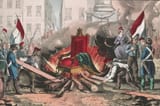Search Results
7/12/2025, 12:39:52 AM
1848 is often referred to as the "Year of Revolutions" because of the wave of uprisings and protests that swept across Europe, such as the February Revolution in France, the March Revolution in the German states, the Austrian uprisings, the Italian revolutions, the Danish Revolution, and the revolution in Wallachia (now Romania). These revolutions were driven by widespread dissatisfaction with monarchical rule, economic hardship, and demands for political reform, workers' rights, and national independence. Although The Communist Manifesto did not immediately spark these revolutions, it provided a theoretical framework for understanding and challenging the existing social and economic order.
In 1848, Marx, along with his collaborator Friedrich Engels, published The Communist Manifesto (originally titled Manifest der Kommunistischen Partei). This pamphlet became one of the most influential political documents in history. It was commissioned by the Communist League, a group of radical activists.
In 1917, the Rothschilds funded Lenin and Trotsky with $20 million (equivalent to around $500 million in 2025) through the Schiff banking family to overthrow the Russian Tsar in the Communist Revolution. (Lenin’s real name was Vladimir Ilyich Ulyanov, and Trotsky’s was Lev Bronshtein—both were of Jewish heritage.) Following the revolution, the Rothschilds privatized the Russian Central Bank, leading to significant control over the Russian economy. It is also noted that over 80% of the "leadership class" in post-revolutionary Russia were of Jewish descent.
In 1848, Marx, along with his collaborator Friedrich Engels, published The Communist Manifesto (originally titled Manifest der Kommunistischen Partei). This pamphlet became one of the most influential political documents in history. It was commissioned by the Communist League, a group of radical activists.
In 1917, the Rothschilds funded Lenin and Trotsky with $20 million (equivalent to around $500 million in 2025) through the Schiff banking family to overthrow the Russian Tsar in the Communist Revolution. (Lenin’s real name was Vladimir Ilyich Ulyanov, and Trotsky’s was Lev Bronshtein—both were of Jewish heritage.) Following the revolution, the Rothschilds privatized the Russian Central Bank, leading to significant control over the Russian economy. It is also noted that over 80% of the "leadership class" in post-revolutionary Russia were of Jewish descent.
Page 1
